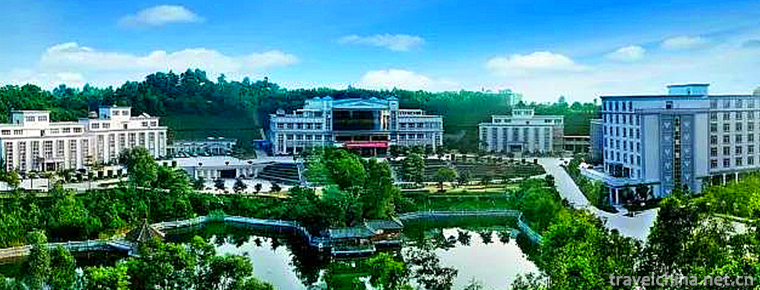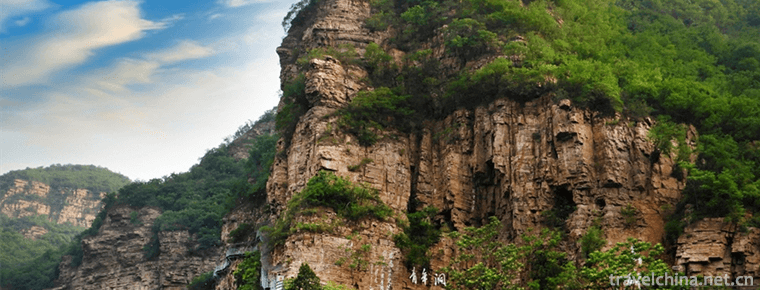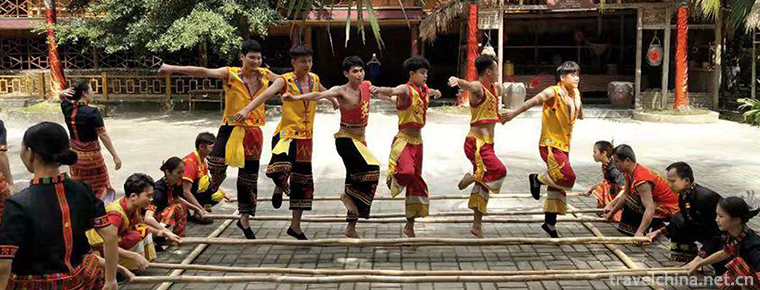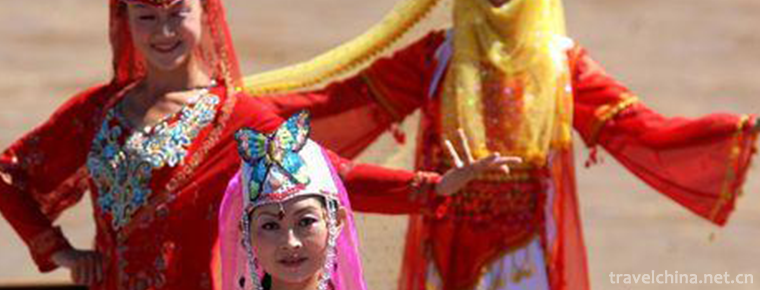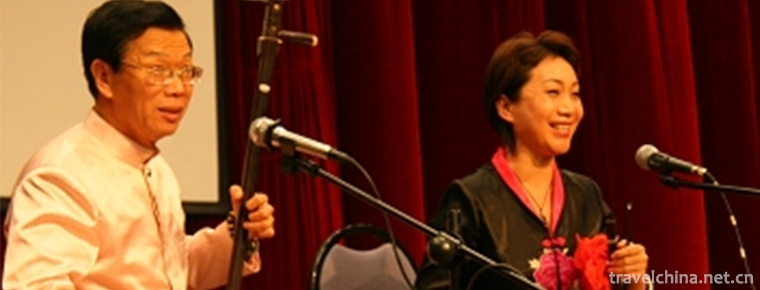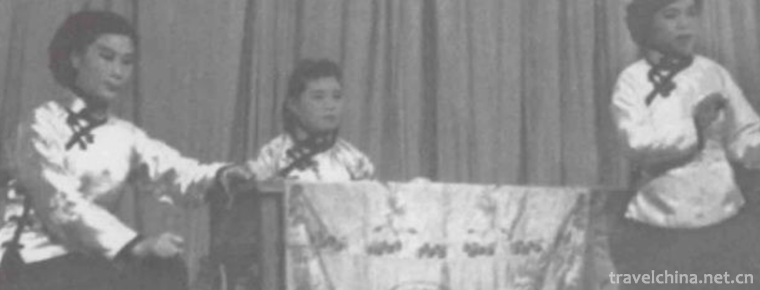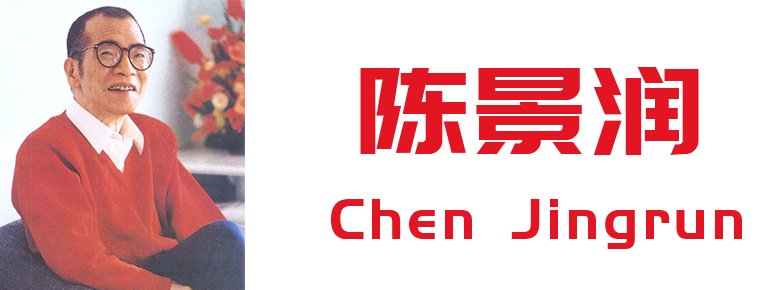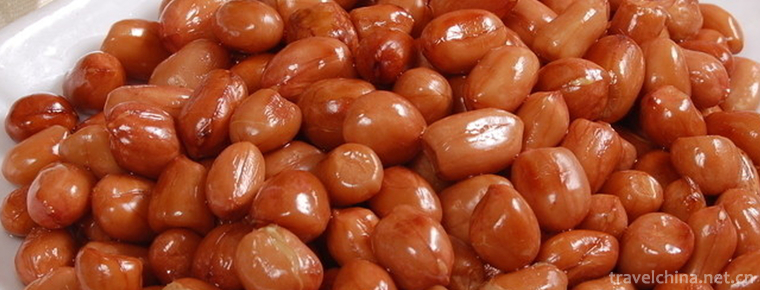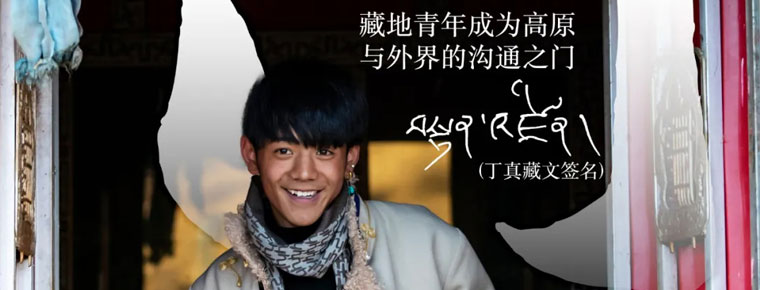Buluotuo
Buluotuo, the traditional folk literature of Ganzhuang Mountain in Baise, Guangxi, China, is one of the national intangible cultural heritages.
In ancient legends, Buluotuo was the founding father of the Zhuang nation, who pioneered the world and was omnipotent. According to the Zhuangs'creation poem Buluotuo, Buluotuo is the "grandfather" of the Zhuangs, and is an omniscient and omnipotent creation god. Buluotuo culture is a typical representative of the traditional culture of the Zhuang nationality. Its connotation includes the Zhuang language, Mojiao, rice culture, the Ganlan of the Zhuang nationality, the traditional costumes of the Zhuang nationality, the folk sacrifices of the Zhuang nationality, the traditional marriage customs of the Zhuang nationality, the folk stories of the Zhuang nationality, the folk songs of the Zhuang nationality, the bronze drums of the Zhuang nationality, the brocade, the embroidery ball, the Tang Emperor, the Master of the Tang Dynasty, the traditional festivals of the
In 2006, Buluotuo was selected as China's national intangible cultural heritage.
historical origin
From the law of the development and evolution of the art form of epic, it can be inferred that the myth of Buluotuo, which was first spread by the ancestors of the Zhuang nationality, should be prose style. Later, in order to facilitate the singing and memory, the myth and legend of Buluotuo in poetry style emerged and developed into today's Buluotuo epic. As a myth and legend, Buluotuo includes the formation of the universe, the birth of human beings, the origin of culture and so on. These contents are not only the shadow of the history of the ancestors of the Zhuang nationality, but also the product of the primitive religious beliefs of the Zhuang nationality. Their birth date is very early, not later than the later period of the primitive clan society. As an epic of Bullot, like the epic of other nationalities, in the process of inheritance, many new contents have been added to form today's system.
According to experts'textual research, in a long period of history, the epic of Buluotuo was only passed on orally. In the Ming Dynasty, manuscripts of ancient and Zhuang scripts appeared and began to be preserved in written form. The manuscripts of ancient and Zhuang scripts of Buluotuo epic, as long as ten thousand lines, were divided into four parts, totaling nineteen chapters: the first part was the opening song, which was divided into ritual song, question and answer song and stone egg song; the second part was the creation song It is divided into the first creation of heaven and earth, man, sun, fire, millet and cattle; the second part is governance song, which is divided into rebuilding heaven and earth and dividing surnames; the fourth part is exhortation song. The whole epic is grand in structure, rich in content, unique in conception, full of rich artistic imagination and strong romantic color. It vividly describes the formation of heaven, earth, sun and moon in the language and form of poetry. The origin of mankind, the cultivation of crops, the raising of livestock, and the production of ancient ancestors praise the great achievements of Buluotuo, the ancestor of the Zhuang nationality.
Cultural characteristics
Content architecture
The content of Buluotuo Sutra Poetry can be roughly divided into three parts in nature: "Creation Myth, Ethics and Morality, Religious Taboos". Its academic value is multifaceted.
The content of Buluotuo includes Buluotuo's creation of heaven and earth, creation of man, creation of all things, emperor of earth, calendar of writing and ethics. It reflects the history of mankind from the ignorant age age of Rumao drinking blood to the agrarian age, and the situation of the tribal society of the ancestors of the Zhuang nationality. According to the edition, the poem is divided into four parts, totaling nineteen chapters. The first part is the opening song, including the first chapter politeness, the second chapter answer song and the third chapter stone egg song. The second part is the song of creation, including the fourth chapter of the creation of heaven and earth, the fifth chapter of the creation of man, the sixth chapter of the creation of the sun, the seventh chapter of the creation of fire, the eighth chapter of the creation of rice, the ninth chapter of the creation of cattle. The third part is the governance song, including Chapter 10 rebuilding heaven and earth, Chapter 11 surname and so on.
artistic characteristics
Buluotuo Sutra Poetry is the text of Zhuangs witchcraft. It recites the creation of heaven and earth by Buluotuo, the ancestor god of Zhuangs, standardizes human ethics and morality, enlightens people to pray for eliminating disasters and evil spirits, and pursues happy life. This classical poem runs through the primitive religious consciousness of nature worship and ancestor worship. Each of the Bratto Sutra Poems can be written independently. It can be said that it is the Creation Epic of the Zhuang nationality because of its considerable content of creating all things in the world; because its lyrics are folk songs and are murmured in sacrificial rites, it can also be said that it is the religious literature of the Zhuang nationality. In the language and form of the poem, Buluotuo vividly describes the process of making heaven, earth, sun, moon and stars, fire, millet, cattle and so on. It tells people about the formation of heaven, earth, sun and moon, the origin of human beings, the origin of various crops and livestock, and people's living customs in ancient times. This epic enthusiastically eulogizes the great achievements of the ancestor of the Zhuang nationality, Buluotuo, the demigod and demigod, in creating human nature. The whole poem is as long as ten thousand lines. It has been passed down orally in Tianyang County, Guangxi Zhuang Autonomous Region since ancient times.
Way of singing
Around the Ming Dynasty, while oral singing, Buluotuo has also been preserved in the form of ancient Zhuangzi writing, some of which have become the folk Mojiao scriptures of the Zhuangs. The original manuscripts of Buluotuo Sutra Poetry are all written in ancient Zhuang characters. Poetry is the five-character style and rhyme of Zhuang folk songs. In content, it integrates the myth, religion, ethics and folklore of the Zhuang nationality, and has profound thoughts and difficult meanings. In form, due to the thousands of years of singing processing, the language is refined and neat, rhythmic and catchy, among which many ancient Zhuang and religious languages are retained, which are nowadays nowhere to be found.
Up to now, the epic of Buluotuo is still spoken and sung, mainly in the Hongshui River Basin and Youjiang River Basin. In the folk, the transmission of Buloto's epic poems is more casual, and there are not too many restrictions on singing occasions.
Singing way
As an ancient and meaningful Creation Epic of the Zhuang people, Buluotuo's epic mainly spreads in the Hongshui River Basin, Youjiang River Basin and Zuojiang River Basin, and also in the Zhuang language and Buyi language areas of Yunnan-Guizhou and Beipanjiang River Basins. In addition to the general oral transmission (the general oral transmission content is incomplete), many places have handwritten copies of ancient and Zhuang characters, and most of them are preserved by wizards or Tao Gong.
Usually in the folk, it is a festival of the whole village or the whole nation, or a major festival before singing, but also must sing the whole poem, and to invite the most intelligent wizard or singer to sing. Everyone must take part in this event with great seriousness and devotion. Singers must be prepared carefully beforehand, not only to review the content of the poem, but also to stop talking (not eating dog meat and beef), self-cultivation (no room after bathing) for seven days, which shows the strict requirements. Whoever can murmur from beginning to end, without missing a word, without missing a word, is praised as the "King of Songs" and is highly respected and praised by people. It is said that in the past, someone used a cow as a tuition fee to go across mountains and mountains to teach the famous song king "Buluotuo".
Inheritance and protection
Inheritance value
The content of Buluotuo mainly includes Buluotuo's creation of heaven and earth, creation of human beings, creation of all things in the world, creation of emperors, creation of written almanac and creation of ethics and morals. It reflects the history of human beings from the initial ignorance era to the agricultural era, as well as the social life of various tribes of the ancestors of the Zhuang nationality, which is related to history, literature, religion, and ethics. Ancient philology, phonology and musicology have important academic value.
In addition, the creation myth of Buluotuo has its original characteristics in content. In the long oral transmission process, it has been processed and enriched by generations of people, and its artistry has been further improved and improved. Buluotuo can not only help people understand history well and meet people's living needs, but also play an important role in enlightenment.
Therefore, the Creation Epic of Buluotuo and the ballad eulogizing Buluotuo's creation achievement can be said to be an encyclopedia of the original form of the ancestors of the Zhuang nationality, which preserves their childish understanding of the objective world and the natural environment, preserves the history of the struggle between the ancestors of the Zhuang nationality and the natural world, and condenses the accumulation of the ancestors of the Zhuang nationality in various aspects of production and life for thousands of years. Tired wisdom and experience.
Inheriting characters
Huang Dajia, male, Zhuang nationality. In June 2009, Huang Dajia was selected as the representative successor of the third batch of state-level intangible cultural heritage projects and declared by Tianyang County, Guangxi Zhuang Autonomous Region. Huang Dajia was born in a family of folk songs. He was the king of songs for generations.
protective measures
Among the academics in Guangxi, Buluotuo was first published as a sort of folktale legend. In 1958, the compiling group of "The History of Zhuang Literature" collected the folk story "Gong Gong Lu Tuo". In 1964, Tongtianxiao Story, collected by Tan Jianzhen, was published in Folk Literature. In 1977, Tan Chengqin and others collected and sorted out the Epic of Blodo (mimeograph). In 1986, Ouyang Ruoshu et al. published The History of Zhuang Literature, in which Buluotuo was introduced and evaluated in detail. In 1982, Nongguanpin and Cao Tingwei compiled Selected Folk Stories of the Zhuang Nationality (the first episode) and collected the myth "Paoluotuo" collected by Tan Jiancai in the early 1960s. In the same year, the Guangxi Folk Literature Series (Volume 5) edited by the Guangxi Folk Literature Research Association published the myth of Bulutuo collected in the 1980s, and the Folk Tales of Wenshan Zhuang and Miao Autonomous Prefecture (Volume 1) edited by the Literature and Art Association of Wenshan Prefecture in Yunnan Province also published the local popular Legend of Buluotuo.
The collation and study of the Book of Blotta began in 1986. In 1978, Guangxi Folk Literature and Art Association collected the song books of Zhaogu soul and Zhaoniu soul in the collecting style, and in 1980, two more complete song books were collected. In 1986, the Office of the Leading Group of Guangxi Minority Ancient Books Publishing and Planning was established, and the "Buluotuo Sutra Poetry" was identified as an important item in the collation of Guangxi ethnic ancient books, which was reported as an important item in the collation of national minority ancient books. After extensive collection, 22 manuscripts of Buluotuo Sutra Poetry have been obtained, and more than 80,000 lines have been translated. Through four years'efforts of experts and scholars in ancient Zhuang characters, national history, religion, folk literature, and Zhuangwen, 1.2 million words of Buluotuo Sutra Poetry Translation Annotation have been sorted out, which preliminarily shows the style of Buluotuo culture.
In 1991, the Office of Collecting Ancient Books of Minority Nationalities in Guangxi organized the compilation and publication of Translations and Annotations of Buluotuo Sutra Poems. In 2000, with the approval of the People's Government of Guangxi Zhuang Autonomous Region, the compilation project of Introduction Series of Chapter I of Zhuang Autonomous Region was implemented. In order to make the world understand Buluotuo culture more comprehensively and provide abundant and solid basic information for the study of Zhuangxue, Guangxi Zhuangxue Series Editorial Committee has included "Zhuangzu Mojing Buluotuo Photocopy Annotation" in the project plan, and organized multi-disciplinary experts and scholars to tackle key problems as a key topic. The manuscripts have been completed in an all-round way, totaling more than 5 million words in 8 volumes, and earning 29 editions in different regions. The handwritten version of "Mojing Buluotuo" is translated literally through Photocopying for people to appreciate and study. In 2003, the Editorial Committee of Zhuangxue Congxue compiled and published eight volumes of Buluotuo Photocopy Annotation of Zhuangzu Mojing, which included 29 copies of Zhuangzu folk religions, 47,500 lines of original poems and 5 million words, providing solid and abundant basic materials for the study of Buluotuo culture.
social influence
Sacrificial activities
In 2013, the sacrificial ceremony of Buluotuo, the ancestor of Zhuangs in Baise City, was held in Ganzhuang Mountain Pilgrimage Square in Tianyang County, Guangxi. Tens of thousands of pilgrims from the Zhuangs areas inside and outside Guangxi jointly worshiped Buluotuo, the ancestor of Zhuangs, praying for peace and happiness in the new year and for a bumper harvest. Buluotuo is a mythological figure in the oral literature of the ancestors of the Zhuang nationality. He is the God of creation, the God of ancestors and the God of morality. Every year from the seventh to ninth day of the third month of the lunar calendar, hundreds of thousands of Zhuang compatriots at home and abroad spontaneously come to Mount Ganzhuang, the origin of Buluotuo, to sacrifice the ancestor Buluotuo. Several ASEAN countries, including Thailand, Vietnam, Laos and Myanmar, as well as compatriots of the eight ethnic groups of the Zhuang and Dong languages in Guangxi, Yunnan, Guizhou and Hainan of China, participated in the sacrificial ceremony. The Buluotuo Folk Culture Tourism Festival in Baise City opened on the same day in 2013. Several ASEAN countries, including Thailand, Vietnam, Laos and Myanmar, as well as compatriots of the eight ethnic groups of the Zhuang and Dong languages in Guangxi, Yunnan, Guizhou and Hainan of China, participated in the sacrificial ceremony.
Tourism culture
Buluotuo culture has become China's national intangible cultural heritage and an important channel for the local restoration of traditional cultural classics. In 2002, when the news spread quickly that Tianyang was the mainstream birthplace of Buluotuo's cultural tradition, there were many projects about Buluotuo's development. Buluotuo and Mliujia have become important ancestors of the Zhuang people. In the Ganzhuang Mountains near Tianyang, the Buluotuo Tourism and Culture Festival has been held every year since 2004. Many scholars of Zhuangxue hope to further promote the Buluotuo culture in the development, rescue and protect the national cultural heritage, and enhance the popularity of Buluotuo folk culture tourism. With the increasingly frequent exchanges between Guangxi and other regions or countries, Ganzhuangshan region has become an important cultural tourist attraction in Guangxi. Every year, the "March 3rd" attracts hundreds of thousands of tourists from home and abroad, which further widens the spread of the legend of Buluotuo.
Cultural anecdotes
1. Suppressing Heavenly Soldiers
Bradha was the creator of the Zhuang family. He is the smartest and wisest man. No matter what happens to him, the strong family should ask him. Ask him what is good, even what is bad.
Buluotuo knows both heaven and earth, and knows people. He makes the heavens hate him very much. He sends the heavenly soldiers and the heavenly generals to arrest him everywhere. One day, when the patrol went to Buloto to pick up grass and hills, the soldiers would lie in ambush at Shanyakou. To the west of the sun, Bullot picked up grass and turned around. He walked with a gust of wind, which made the woods on the hill shake wildly. Bullot turned over the beam, and the soldiers swarmed up. Before they touched him, they were beaten up by flying sand and rocks, screaming and screaming. Heavenly soldiers will have to return to heaven.
Bullot had no clothes. He rested under a evergreen tree for many years. After his death, he was buried under a evergreen tree. On a rock, there were handprints he had touched. Up to now, the Zhuangs have commemorated the evergreen trees beside the stockade as divine trees to mourn the creator, Buluotuo.
2. Shoot the Sun
Tens of thousands of years ago, there were nineteen suns in the sky. The water in the river dried up, the green leaves on the hill burned charcoal, and the Bumblebee went to the bottom of the river to make a nest. The men and women in the village, large and small, couldn't live any longer, so they went to see Bulota together.
Bullot stood under a big green tree and said, "To save the earth and the people, we need to shoot down nineteen suns. You go to find the hero of the strong family. Don't look for the singer, but for the mighty three-section survivor, Lang Zheng.
Zhuangjia found three sections of Hand Lang Zheng, and gave the rest of the rice to Lang Zheng to eat, and the rest of the rice wine to Lang Zheng to drink. Lang Zheng stood up after he had eaten and drank enough. He put his head on the beam, stretched out three hands, took the carved bow from the top of the East wall, took the arrow from the top of the West wall, and went away to say goodbye to the villagers.
Lang was climbing to the top of the East Cliff before dawn, with his feet in the cracks in the rocks and his eyes fixed on the East. At daybreak, nineteen Suns came out of the top of the mountain one after another. Lang is taking advantage of the sun is not too dazzling, one hand bow, one hand arrow, shooting the first arrow to the first sun out of the mountains. With a loud noise, the first sun was set. Then Lang Zheng bent his bow and struck an arrow, shooting at the rising sun, which fell one after another. He took the remaining two arrows and aimed at the remaining two suns. Just then, the villagers at the foot of the mountain shouted, "Lang Zheng, our good Lang Zheng, please put down your bows and arrows and leave us two suns!"
Lang Zheng listened, took down the two arrows that were about to shoot, and answered loudly, "My fellow countrymen, good fellow countrymen, I have laid down the bows and arrows of shooting the sun, leaving a sun to sun your food during the day, and a sun to change the moon to be your companion at night."
3. Suppressing Leopards
In ancient times, the leopard in the mountains had many pregnancies and had close offspring, but few survived. So the leopard went to Buluotuo for advice.
When the leopard saw Bullot under the tree, he cried and said, "Lord, my ancestors and grandfathers have failed to produce their offspring. Please God find a way to rescue us!" Bullot knew that the leopard did evil, did not do good, and hated it, so he said with ridicule: "As long as you do less, accumulate more good, in December of a year, every child born every month will be a weapon." The leopard listened, satisfied, and wagged his head and tail away.
Along the way, the leopard proudly recited Bulota's reply aloud. The meek elf's yellow muntjac heard the leopard's chant in the grass by the roadside. He was shocked and ran to Bulota's report in one breath. "The leopard shouted all the way, it would have twelve births in December, and the fetuses would have become organs. In this way, the Yellow muntjac would be extinct." When Bullot heard it, he remembered that he had lost his mouth in front of the leopard. He said to the muntjac, "You have long legs, run fast, catch up with the leopard, shout and frighten it, so that the leopard will be frightened and forget what I said."
The yellow muntjac catches up with the leopard desperately, gathers all his strength and sends out "cluck..." "..." A few strange cries. The leopard was startled and belched in delight. It really forgot what Bullot had said.
So the muntjac was saved.
The leopard forgot the original words and went to Bullot again. "As long as you accumulate more good deeds and commit fewer crimes, keep one litter a year, give birth to one litter of children in the first two years, get two litters in the third year, and eat the old woman in the second litter," Bulota said. It is said that Bullot's words have been fulfilled on the leopard.




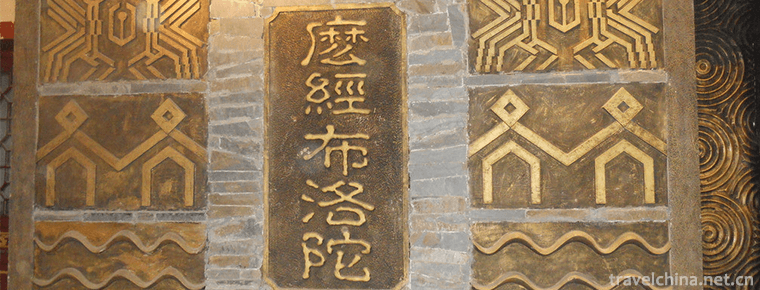
-
Jingming Hot Spring Resort
Jingming Hot Spring Resort is the largest resort in China. It is located in Jingxi Garden Town, Jiexi County, Jieyang City, Guangdong Province. It is built by Shenzhen Anyuan Investment Group Co., Ltd.
Views: 338 Time 2018-12-22 -
Red Flag Canal Scenic Area
Red Flag Canal Scenic Area is a national AAAAA class scenic area, covering an area of five square kilometers. Red Flag Canal Scenic Area is composed of Red Flag .
Views: 404 Time 2019-01-16 -
Li nationality firewood dance
The firewood dance is one of the representative folk dances of the Li nationality. It is called "Turn Brake" and "Taisha" in the Li dialect. It originated from the funeral custom o.
Views: 214 Time 2019-05-12 -
Production Techniques of Pu er Tea
Pu'er tea production technology, also known as tribute tea production technology, has been formed through thousands of years of practice. The basic procedures are as follows: sacrificing the God of te.
Views: 92 Time 2019-06-09 -
Salar Folk Songs
There are many kinds of Salar folk songs. In the course of long-term historical development, they have formed colorful and distinctive musical forms and singing styles. Salar folk songs keep the ancie.
Views: 154 Time 2019-06-12 -
Shandong Qinshu
Shandong Qinshu is one of the traditional folk art varieties in Shandong area, also known as "Xiaoqu", "Yangqin", "Shandong Yangqin", "improved Qinshu" and so o.
Views: 186 Time 2019-06-13 -
Wulin Diao
Wulin Diao evolved from the folk propaganda of Baojuan and formed in the late Qing Dynasty. The performance form of Wulin tune is mainly sitting and singing, which combines narrative and singing. One .
Views: 385 Time 2019-06-30 -
Chen Jingrun
Chen Jingrun (May 22, 1933 -1996 March 19th), male, Han, non party personages. Fujian Fuzhou Man, a contemporary mathematician..
Views: 127 Time 2019-09-07 -
Anhui Agricultural University
Anhui Agriculture University is located in Hefei, capital of Anhui province. Center Urban area Key universities in Anhui By Ministry of agriculture and rural People's Republic of China State Forestry .
Views: 189 Time 2019-10-10 -
Fried peanuts
Fried peanuts is a dish made of peanuts and other materials. It belongs to the family dish and serves wine. When drinking, people often choose this dish as the next dish..
Views: 316 Time 2020-03-15 -
The world is so big still meet you Cheng Xiang Tik Tok Songs 2020 Hot Songs
"The world is so big still meet you " is composed by htet Aung Lwin and sung by Cheng Xiang. It is the Chinese version of myanmar music "for Ma". It was officially released on Janu.
Views: 93 Time 2020-05-21 -
About Ding Zhen Video
In November 11th CCTV news and Oriental tiktok were put on a short video of the tremble. Ding Zhen, the "sweet boy" in the video, triggered a phenomenal network event with a transmission volume of more than 5 billion times. At the same time,.
Views: 136 Time 2020-12-06
